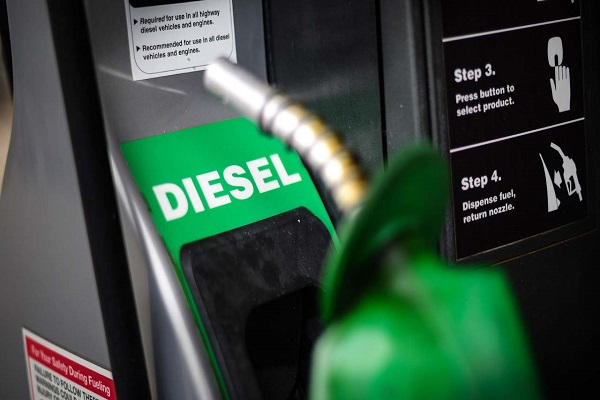As Diesel Cost Soars

The soaring cost of Automotive Gas Oil (AGO), may have opened another vista of challenges for the troubled oil sector. While the price of the product has risen by about 100 percent in the last two months, Nigerians are concerned about the ripple effects on the country. MUYIWA LUCAS reports.
As a deregulated oil product in the country, government and Nigerians may not have paid much attention to the slowly but steady rise in price of the Automotive Gas Oil (AGO), or diesel. Perhaps, the recently experienced “dislocation” in the supply of Premium Motor Spirit (PMS) otherwise known as petrol, may have further overshadowed the rise in price of this commodity, used largely by heavy duty vehicles and manufacturing industries across the country.
However, the rude awakening of consumers of the product earlier this week to the about N700 per litre price of the AGO has left many users shocked. For instance, from an initial price of about N288 per litre, diesel, earlier this week,hit an all time high of N700 per litre.
This surge in the price of the product represents a 120 per cent increase in less than two months, when compared to the N288 per litre that it sold in January 2022, according to the figure released by the National Bureau of Statistics (NBS). More worrisome is the pace of its increase. For instance, in a space of three days, the price was said to have jumped from N540 per litre to N630 per litre.
Although the free fall of the naira has been blamed for this, as it has affected the cost of importing the product, the unprecedented rise in the global cost of crude oil in recent times remains a strong factor, which has now been further buoyed by the Russia-Ukraine face-off. The National Operations Controller, Independent Petroleum Marketers Association of Nigeria (IPMAN), Mike Osatuyi, said that the recent increase in oil prices had led to further hikes in diesel prices in the country.
The high cost of diesel has been compounded by the epileptic power supply and sometimes power blackout, which has increased the demand for the product as industries, businesses and households would need to power their generators.
International experts have also blamed the development on the fact that diesel stock in Europe are presently at their lowest since 2008. Nigeria imports diesel mainly from Europe.
In early February, the supply tightness in crude oil, gas, and coal across Europe was beginning to spread to oil products, most notably middle distillates, the most popular among which is diesel fuel.
In her analysis, Irina Slav, of oilprice.com, argued that a further rise in diesel prices is expected as production still has to catch up with demand. She explained that diesel, whose biggest market is freight transport, got hit severely during the pandemic lockdowns as transport rates declined. After the end of the lockdowns, however, as economies began to recover from the worst of the pandemic, transport picked up, and diesel fuel demand jumped.
In the United States, the situation is graver still. There, diesel fuel inventories are 21 per cent lower than the pre-pandemic five-year seasonal average, which translates into 30 million barrels. In Singapore, a global energy trade hub, diesel fuel inventories are four million barrels below the seasonal five-year average from before the pandemic.
According to John Kemp of Reuters, what is perhaps worse, however, is that over the past 12 months, the combined diesel fuel inventories in the U.S., Europe, and Singapore, have shed a combined 110 million barrels that have yet to be replaced.
On top of all this, Russia is a major supplier of diesel, meaning Western sanctions for its invasion of Ukraine are affecting these supplies too. With the market increasingly tight, Shell and BP have shied away from offering any diesel fuel cargos on the German market for two weeks, Reuters reported last week, for fear of shortages.
In the UK, meanwhile, the Daily Mail cited analysts as warning that the government may need to resort to diesel fuel rationing from next month because of the state of the market and the ban on Russian oil imports, which include diesel fuel. Russia supplied a third of the UK’s imported diesel before the ban.
“Risks of energy rationing and ultimately a recession are growing by the day – something most policymakers seem to be ignoring or not grasping right now. If Russian oil is not integrated back into the market within the next few weeks, we are at a real risk of having to ration crude and products by the summer,” the Daily Mail report quoted an unnamed spokesman for consultancy Energy Aspects as saying.
Back in February, Morgan Stanley recalled a situation in 2008, when diesel fuel prices reached $180 per barrel, while crude oil was flirting with $140. And there wasn’t a war in 2008. “A repeat of that is not our base case, but it is notable that diesel prices have been tracking the 2007-08 period closely in recent months,” the bank’s analysts said, as quoted by Reuters’ Edwards, adding they expected crude to reach $100 per barrel in the second half of the year. Of course, both Brent and WTI reached that only days after this forecast was made.
A tight supply situation invariably pushes prices higher, which cannot be good news in an environment of persistently high inflation coupled with soaring energy prices that keep on feeding that inflation. Diesel, it seems, is turning into more kindling for consumer prices amid the Ukraine war and the sanctions. Kemp noted that even diesel fuel production growth may not help, as it would only move the shortage from diesel fuel to crude.
Meanwhile, the Manufacturers Association of Nigeria (MAN) has warned that the situation will lead to surge in the prices of goods and services. “The rise in the price of diesel means higher production cost for manufacturers because most of us rely on diesel to produce. So when the cost of production is high, then manufactured products will be sold at a higher price, this is to enable the manufacturer to make a profit after-sale and stay afloat. So basically it will increase the inflation in the country which is already high, further compounding the problems and plight of Nigerians,” a source in the Association said.








